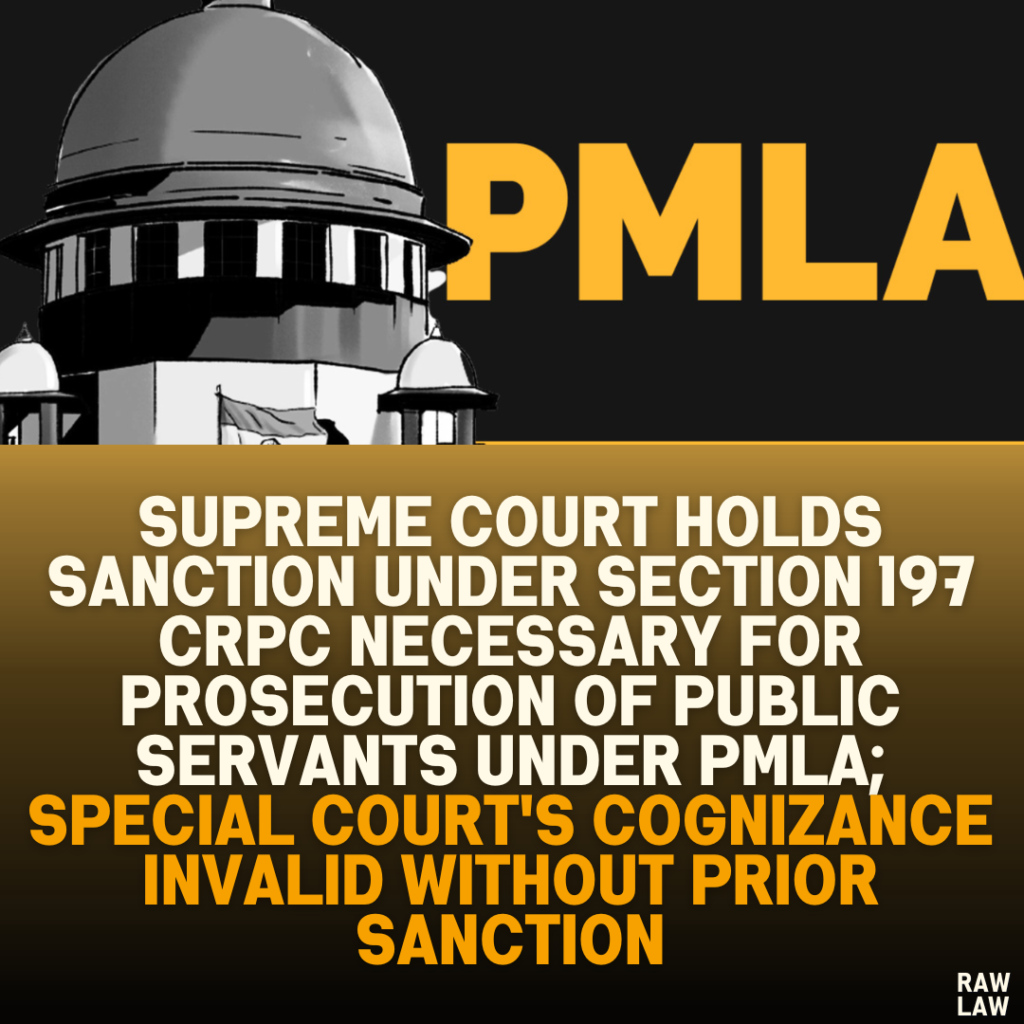Court’s Decision
The Supreme Court upheld the High Court’s decision, quashing the cognizance taken by the Special Court against the respondents, two public servants, under the Prevention of Money Laundering Act (PMLA). The Court confirmed that previous sanction under Section 197 of the Code of Criminal Procedure (CrPC) is required before prosecuting these individuals, as their alleged acts were performed within the scope of their official duties.
Facts
The Directorate of Enforcement filed complaints under Section 3 of the PMLA against two respondents, alleging that the respondents engaged in money laundering. The complaints were based on their involvement in unlawful activities, including the allotment of land and allocation of resources to private entities, in contravention of regulations. The respondents argued that as public servants, the Special Court could not take cognizance of the complaints without prior government sanction under Section 197 of the CrPC.
Issues
The primary issue was whether sanction under Section 197 of the CrPC is mandatory before cognizance can be taken in cases under the PMLA when the accused are public servants and the alleged acts relate to their official duties.
Petitioner’s Arguments
The Directorate of Enforcement argued that the PMLA overrides the CrPC under Section 71 of the PMLA, meaning the requirement for a sanction under Section 197 of the CrPC should not apply. They contended that the acts attributed to the respondents went beyond their official duties, as they involved offenses punishable under the PMLA.
Respondent’s Arguments
The respondents argued that as public servants, they were protected by Section 197 of the CrPC, which mandates prior government sanction for prosecution if the alleged acts were carried out in the discharge of their official duties. They also cited provisions from the Memorandum of the Corporation, which established that their appointments and removals were under the authority of the State Government.
Analysis of the Law
Section 197 of the CrPC provides that a sanction is necessary before a court can take cognizance of offenses committed by public servants in the discharge of their official duties. Section 65 of the PMLA states that CrPC provisions apply to proceedings under the PMLA, provided they are not inconsistent with the PMLA. The Court noted that there was no inconsistency between the PMLA and the requirement for sanction under Section 197 of the CrPC.
Precedent Analysis
The Court referred to several precedents to interpret Section 197 of the CrPC, including:
- Centre for Public Interest Litigation v. Union of India: Affirmed that protection under Section 197 applies if an act reasonably connects with official duty.
- Prakash Singh Badal v. State of Punjab: Emphasized that the need for sanction under Section 197 could be evaluated at any proceeding stage, depending on the circumstances.
- P.K. Pradhan v. State of Sikkim: Defined the need for a reasonable connection between the act and the official duty for Section 197’s protection.
Court’s Reasoning
The Court found that the acts in question related to the respondents’ official roles and duties. Therefore, the requirement for sanction under Section 197 was justified to protect public servants from prosecution for actions tied to their official duties. The Court further reasoned that the PMLA does not exclude the applicability of Section 197 of the CrPC. It held that if Section 197 applies via Section 65 of the PMLA, it remains unaffected by the PMLA’s overriding clause in Section 71, as no inconsistency exists between the two provisions.
Conclusion
The Court ruled that the cognizance taken against the respondents by the Special Court is invalid without prior sanction. It clarified that while the cognizance was set aside for the respondents, the proceedings against other accused in the complaints remained unaffected. The Enforcement Directorate retains the option to seek cognizance in the future upon obtaining the necessary sanction.
Implications
This judgment reinforces the legal protection afforded to public servants under Section 197 of the CrPC, emphasizing the requirement for government sanction in criminal proceedings for acts linked to official duties. It clarifies that the PMLA does not override the CrPC in such contexts, thus upholding the procedural safeguards for public servants facing criminal allegations under special legislation like the PMLA.




Pingback: Supreme Court Declares Unilateral Arbitrator Appointment Clauses in Public-Private Contracts Unconstitutional, Upholds Principle of Equality and Neutrality in Arbitration - Raw Law